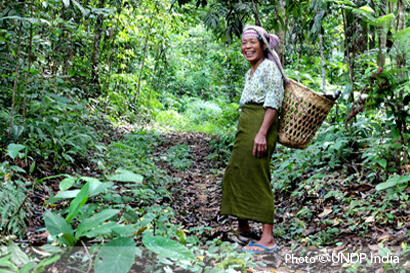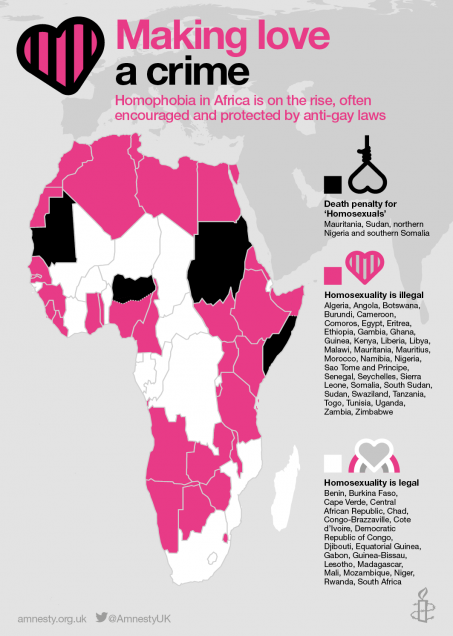Category: Legislation Abroad
The Movement to Repeal a Colonial-Era Sodomy Law in Namibia
Namibia, located in Southern Africa, is, in terms of public opinion, one of the most LGBTQ+ tolerant countries on the continent. However, sodomy is still criminalized under Roman-Dutch common law, discrimination of LGBTQ+ people is legal, and same-sex marriages are not recognized by the courts. While all of these issues work in tandem, right now, the greatest threat to the rights of LGBTQ+ people in the country is the unconstitutional Combatting Immoral Practices Act of 1980. Activists have been working diligently to bring attention on both domestic and international scales to this injustice and the country’s leadership have shown that they are open to a shift in the status quo.
History of LGBTQ+ People in Namibia
Many modern-day groups in Namibia have historically engaged in same-sex marriages, sexual intercourse, and tradition. Some of these groups include the Khoikhoi, Ovambo, Nama, Herero, and Himba peoples. Additionally, the Ovambo people have the tradition of the esenge, where people assigned as male at birth would dress like women, perform womanly duties, and marry men. It is believed by the Ovambo that these people were possessed by female spirits. (173-242) The first anti-sodomy trials in modern-day Namibia occurred while it was under German colonial rule: four Europeans were banished from the colony for violating paragraph 145 of the German code, which criminalized men having sex with men. (106) When Namibia became a mandated territory of South Africa in 1920, South Africa implemented their Roman-Dutch common law on the country, including their anti-sodomy law. (116) Since Namibian independence in 1990, Namibia has never prosecuted anyone under their sodomy common law (9), however, the politicization of homophobia and the Combatting Immoral Practices Act of 1980 make the legal landscape of the nation hostile to LGBTQ+ individuals.
While anti-sodomy laws are the result of colonization, politicians and judges in Namibia have shifted that narrative by using rhetoric claiming that LGBTQ+ people are actually the “colonial import.” In the late 90’s and early 2000’s, politicians were often asked by media about their thoughts on LGBTQ+ individuals, with some going so far as to say that they wish to “eliminate” LGBTQ+ people. An unenforced 2001 request from the President to, “arrest, imprison, and deport homosexuals and lesbians found in Namibia,” went even further in politicizing homophobia for the sake of perceived political gain. In the 2010’s, political parties, both those in power and opposition groups, made efforts to make homophobia a platform of their parties.
The Combating Immoral Practices Act of 1980
At the common law, sodomy is considered a Schedule I offense (along with rape, murder, and other serious crimes), which means that officers can arrest a suspected sodomizer without a warrant and can utilize deadly force during the arrest. (10) Additionally, while the criminalization of same-sex (male only) sodomy is baked into the common law of the country, the Combatting Immoral Practices Act of 1980 strengthens the legal discrimination against LGBTQ+ people in Namibia. (103) While this law does not make homosexuality itself illegal, it criminalizes certain “immoral” sexual acts, which in combination with common law, includes sodomy, mutual masturbation, and oral sex. (12) Additionally, it is important to note that while this act applies to all members of society, certain provisions within it can easily be interpreted to target LGBTQ+ individuals for “committing immoral acts.” These provisions include sections 7 and 8, which condemn the enticing of and commission of immoral acts. Additionally, under the act, the owner of a home that permits “immoral acts” to occur within it is subject to punishment. The term “immoral act,” is never defined in the legislation, creating an issue of vagueness and notice concerns for those that could be charged under the act. Given that this law does not define “immoral acts,” things as simple as a same-sex kiss in the street could be interpreted as illegal. An example of one of the harmful interpretations of this act is the Namibian government’s decision to deny prisoners access to condoms, stating that sexual activities between prisoners in a male prison would be “immoral practices.” (16)
As previously noted, vagueness is a particularly large concern within the confines of the act. For example, section 17(1) of the act criminalizes the manufacturing, selling, or supplying of “any article which is intended to be used to perform an unnatural sexual act.” This vagueness led sex shops to bring suit to the Namibian High Court to challenge the constitutionality of this language, as it could impede on their constitutional right to carry on a business. The Court found the “unnatural sexual act” language unconstitutionally vague as it did not provide any guidance on what these were. Additionally, the Court found that “‘unnatural’ involves a value judgment varying from country to country, race to race, and age to age; it has little if any objective content.” The Law Reform and Development Commission of Namibia believes that, given this ruling, “the common law crime of ‘unnatural sexual offenses’ would be similarly unconstitutional.” They base this belief on two hypotheses: 1) that it limits other constitutional rights, such as the right to privacy and 2) that it is “an affront to the rule of law” because its vagueness does not properly put people on alert of what specific behaviors could be criminalized. (27-28)
Efforts to Advocate for LGBTQ+ Individuals in Namibia
According to the Namibian Constitution, all laws in effect at the time of independence, including common law, will continue to be in effect until Parliament repeals them or the Court rules them to be unconstitutional. (Art. 66-1) In 2019, the Law Reform and Development Commission of Namibia identified the criminalization of sodomy and of “unnatural sexual offenses” to be obsolete laws. With the funding and advocacy of nonprofits and civil society groups, they were able to complete a report to Namibia’s Minister of Justice in 2020 advocating for repeal. The Commission cites to the Ombudsman’s 2013 Baseline Study Report on Human Rights in Namibia and the Parliament’s National Human Rights Action Plan 2014-2019 as supporting sources for their contention that this “vulnerable group” of LGBTQ+ individuals is unfairly discriminated against and criminalized for constitutionally protected behavior. (1-2) The Commission believes that the constitutional rights being harmed by this law are the right to be equally protected under the law, the right to be free from discrimination based on sex, the right to dignity, and the right to privacy. (12-27) The end of the report includes an appendix with draft legislation to be introduced by the Minister of Justice to Parliament to repeal these laws (67-68). In response, the Namibian Justice Minister, Yvonne Dausab, announced an intention to propose the repeal of this legislation.
Civic society groups have been at the forefront of pushing these changes. Some of these groups have joined together in a coalition called the Diversity Alliance of Namibia (DAN). Namibia also has the Outreach Health drop in center, which was the first LGBTQ+ health center in the country. Additionally, in 2021, the Namibia Equal Rights Movement organized the largest pride parade in the country’s history, advocating for the repeal of the laws criminalizing LGBTQ+ people. My friend and former colleague, Omar Van Reenen, is an organizer with Equal Namibia, a youth-led movement advocating for constitutional protections for LGBTQ+ people in Namibia. On an Africa Good Morning episode, Van Reenen stated that, “[t]he Constitution mandates protection of all minority and vulnerable groups. LGBTQ+ people are not asking for ‘more rights’ than heterosexual Namibians. They are asking for the ‘exact same rights’, the exact same liberties and exact same privileges under the Constitution.”
 Rose Collins graduated from Boston University School of Law in May 2022.
Rose Collins graduated from Boston University School of Law in May 2022.
The Fear of Forcible Eviction: Deficiencies in India’s Forest Rights Act’s Recognition of Indigenous Land Rights
Land rights has been an ongoing issue in India for many years now, but there are some communities that end up being more vulnerable than others. This was made clear on February 13th, 2019, when the Supreme Court of India released an order for mass evictions of indigenous forest dwellers from forest areas for the goal of conserving these lands. Here, the conflict itself is not surprising because evictions has been a persistent issue throughout Indian history, but it is the degree of how many individuals would be impacted that made this news so surprising.
This order was later stayed for the purpose of asking states to provide more details on the steps of eviction due to the nearly one  to two million indigenous people who would be affected by the declaration. This order is significant for illustrating the deficiency in current legislation and also for shedding light on the consequences faced by vulnerable communities who live in fear of being forcibly evicted from lands that they live on, depend on, and survive on. This article will lay out the process and current critiques of the FRA, and further discuss the ongoing arguments for and against the mass eviction ordered in the February 13th decision.
to two million indigenous people who would be affected by the declaration. This order is significant for illustrating the deficiency in current legislation and also for shedding light on the consequences faced by vulnerable communities who live in fear of being forcibly evicted from lands that they live on, depend on, and survive on. This article will lay out the process and current critiques of the FRA, and further discuss the ongoing arguments for and against the mass eviction ordered in the February 13th decision.
Forest Rights Act of 2006
Enacted in 2006, the Scheduled Tribes and Other Traditional Forest Dwellers (Recognition of Forest Rights) Act (commonly referred to as the Forest Rights Act (FRA)) was intended to protect indigenous populations. The FRA sought to substantiate and recognize land claims of forest dwellers. The FRA brings two groupings of individuals within its purview:
- Forest dwelling Scheduled Tribes, which includes members of Scheduled Tribes who primarily reside and live off the land, and
- Other traditional forest dwellers, which includes anyone who can prove that they have resided on and lived off the land for “at least three generations.”
To obtain legal recognition of their land rights individuals must file a three stage claim.
- Stage 1: The first stage begins at the level of the Gram Sabha, which is generally a village assembly at which a person presents their claim to the land. At this assembly people are elected to the Forest Rights Committee, which investigates the claim and presents its findings to the village assembly. Acceptable forms of proof to support a land claim are governed by Rule 13 of the Comprehensive Tribal Rules.
- Stage 2: After the Forest Rights Committee presents findings to the village assembly, the second stage begins with the review of the claim by the Sub-Divisional Level Committee.
- Stage 3: Thereafter, the third stage is set at the District-Level Committee which determines the fate of the claim; either a claim will be accepted or rejected. If rejected, an appeals process is available to the claimant, but it is uncommon.
Despite being considered a step forward, the FRA’s deficiencies serve to negatively impact indigenous forest dwellers.
- Inexperience: First, there is the issue of inexperience with the legal system as this Act imposes a legal process that these groups may be unfamiliar with and therefore will find it more difficult to complete fully and accurately.
- Inaccessibility: Second, there is the issue of inaccessibility, because the Act imposes a standard form, but does not consider diversity (i.e. approximately 705 diverse ethnic groups that are legally recognized) and how such a form could be inaccessible to individuals not speaking the same language or who have different customs on resolving disputes.
- Impractical: Third, there is the issue of impractical standards. As the definition of the other traditional forest dwellers mentioned above indicates, part of the process of getting the land right recognition requires a claimant to present proof of residence in the forest area for at least three generations. The following two factors show how this is not a practical standard:
- First, having difficulty preserving documentation that dates so far back when living a nomadic way of life,
- Second, it be unlikely to have had an opportunity or need to compile such documentation beforehand.
- Inadequacy: Lastly, there is the issue of inadequacy, as this procedure is set up in a way that can be influenced by adverse interest groups who may have alternate plans for the forest areas that indigenous groups call home.
These deficiencies illustrate how complex the issue is, and how there are a number of structural issues that need to be resolved in order to provide the protection that these groups need.
Arguments For And Against Forced Evictions
The February 13th order is unclear on the forced eviction of indigenous groups. Those opposed to indigenous groups residing in forest lands claim that the current destruction of forest areas is attributable to indigenous dwellers whose practices and way of life prove to be harmful to these areas. Furthermore, opponents such as the conservationists are not entirely sold on the purpose the FRA serves in recognition of land rights.
Supporters of indigenous forest dwellers, however, characterize these dwellers as the forest’s guardians because their practices prove to be less harmful to the land. Having resided on the land for many generations, their history, culture, and practices are tied with the land in an inexplicable way, and so evictions can prove to be disastrous to these communities especially when they are executed through force.
There have been many incidents when forced evictions have been executed through use of force (i.e. threatening behavior, destruction of home, etc.). Such evictions are expected to have dire consequences for evicted individuals, but with communities as cohesive as indigenous groups the consequences are even more far reaching. Not only are they at risk of induced poverty and danger, but community and social life are broken down forever.
These consequences indicate a systemic and pervasive issue that requires resolution. The starting point for this is amending the FRA by making it simpler and stronger by addressing the deficiencies listed above. Only through amending this Act can real change begin to happen.
Note: This article is based on a paper originally submitted in the Environmental Justice class at BU Law.
 Nabaa Khan anticipates graduating from Boston University School of Law in May 2021.
Nabaa Khan anticipates graduating from Boston University School of Law in May 2021.





